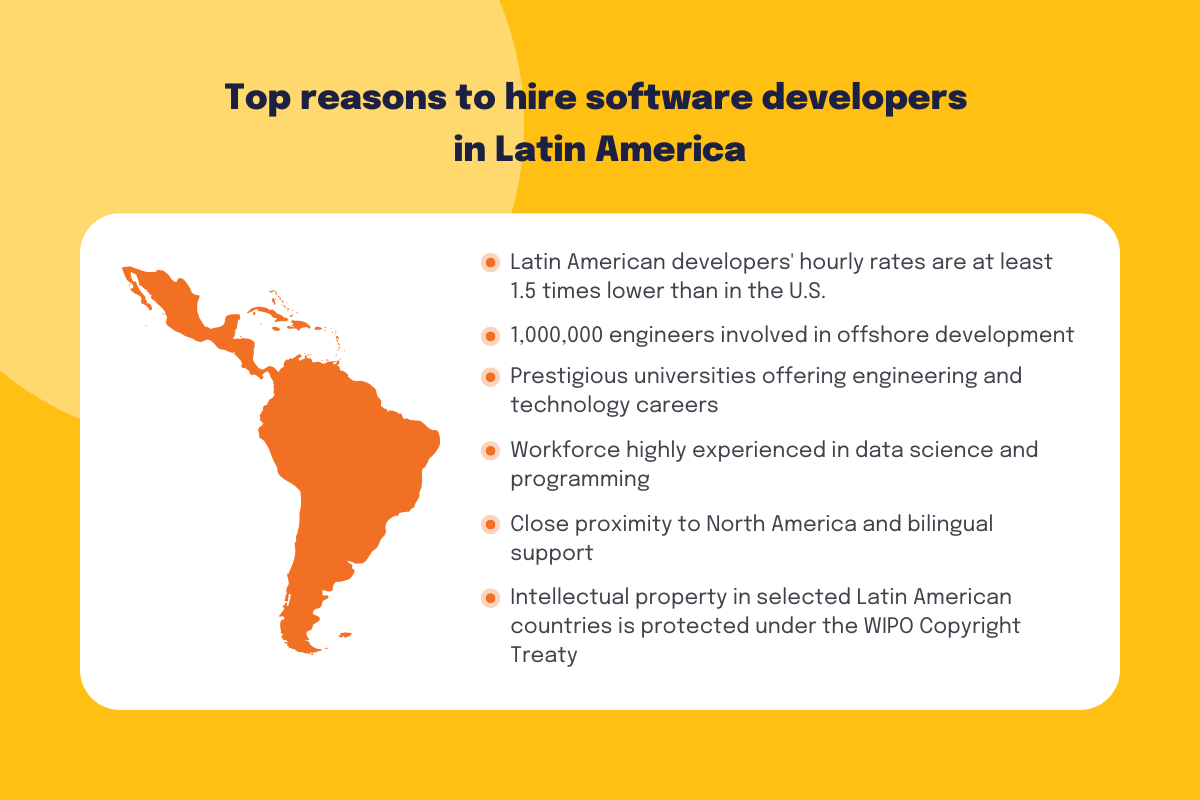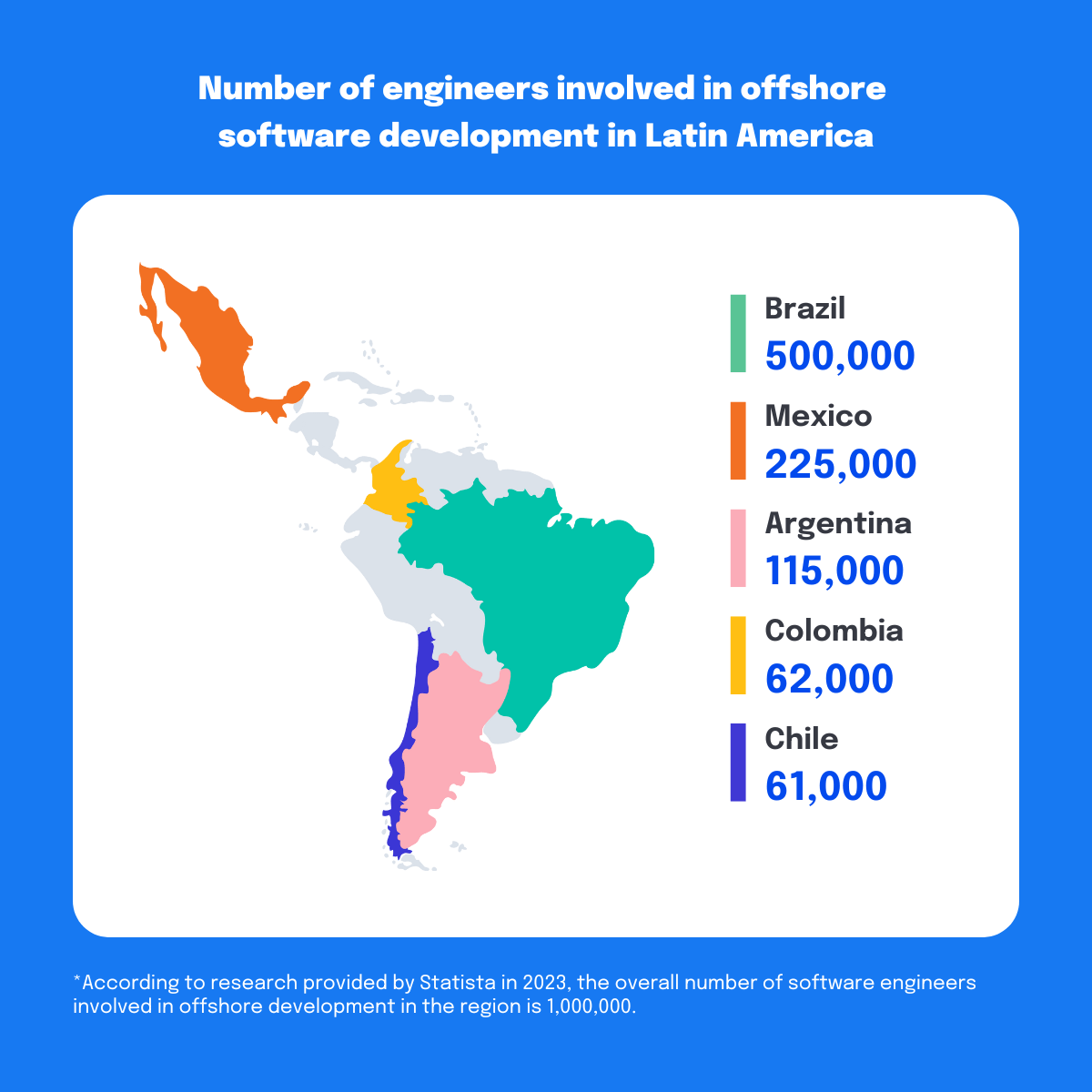From Brazil’s new plan to digitize 90% of all businesses in the industrial sector, to the joint initiative by Scotiabank and Laboratoria to help Latin American women gain access to training and jobs in the tech field, innovation and advanced learning are taking center stage in the region.
Meanwhile, the revenue in the Latin American IT outsourcing market is projected to reach $16 billion in 2024, with an expected annual growth rate of 12.26% from 2024 to 2028, resulting in a market volume of $25 billion by 2028. Latin America continues to attract businesses due to its lower development costs, large talent pool experienced in programming and data science, and overlapping time zones, which are particularly convenient for North American companies. We will further explore the most crucial reasons for finding and hiring software developers in the LatAm region.
Table of Contents
Summary
- The Latin American outsourcing market is projected to reach $16 billion in revenue by 2024. (In a global comparison, the highest revenue in 2024, totaling US$185.50 billion, is expected to be generated in the United States.)
- Businesses are drawn to the region due to its proximity to North America, bilingual support, and a large pool of skilled IT professionals.
- Developers in Latin America generally earn annual salaries that are roughly half those of their U.S. counterparts and have hourly rates that are at least 1.5 times lower.
- Software developers in Latin America share time zones with U.S. companies, making it easier to schedule meetings during regular business hours.
- Remote tech talent in the region faces competition with a global pool of applicants, making English fluency a key factor in professional development and a gateway to broader knowledge.
1. Cost efficiency
Budget flexibility in hiring allows businesses to adjust their overall strategy. When companies decide to save on hiring costs, they can subsequently allocate more resources to R&D, marketing, and expanding into new markets.
Latin American developers have an obvious advantage over their peers in the U.S. in terms of average salaries and rates, particularly due to favorable exchange rates for businesses registered in the U.S., which is one of the strongest currency economies. We have provided a spreadsheet comparing salaries below.
The main concern that could arise is whether less expensive talent would compromise its quality. However, the region’s tech talent pool is growing, and many software developers have a strong technical education and robust experience working with North American software companies. The only challenge is to source and vet the best candidates.
Senior Software Engineer pay range, USD
| Country | Estimated yearly salary, min | Estimated yearly salary, max |
| United States | $150,000 | $219,000 |
| Chile | $38,000 | $76,000 |
| Colombia | $34,000 | $96,000 |
| Costa Rica | $95,000 | $118,000 |
| Mexico | $55,000 | $138,000 |
Source: Glassdoor’s Total Pay Estimate, which may include cash bonuses, commissions, tips, and profit sharing.
2. Time zone compatibility
Most countries in Latin America are located in time zones that are either the same as or only a few hours different from those in the United States. Due to this overlap, teams can schedule agile ceremonies, feedback sessions, and other critical meetings during business hours, in contrast to early morning or late evening calls that often occur when there are significant time zone differences. In addition, team members working during the same business hours can respond faster and solve problems with tight deadlines more quickly.
3. Highly skilled candidates
With numerous prestigious universities offering engineering and technology programs, a thriving startup culture, and investments in developing IT infrastructure, the region is nurturing top technical talent proficient in remote communication and critical thinking. Developers in Latin America view the tech industry as a sustainable yet dynamic field that offers them more prospects for career advancement.
With the projected revenue growth in the IT outsourcing market, many Latin American programmers are involved in offshore development and have hands-on experience in building products for other companies. Several international companies have established R&D offices or branches in Latin American countries, capitalizing on the region’s growing tech sector and skilled talent pool. For instance, HCLTech, a multinational IT consulting firm, has set up offices in Guatemala City, Rio de Janeiro, Paraná, Pernambuco, and Amazonas states, along with a Global Delivery Center in São Leopoldo. IBM invested $21 million in its Security Operations Center in Costa Rica, which monitors security events for hundreds of clients across 130 countries. The Metropolitan Region of Campinas in São Paulo hosts branches of numerous national and international IT companies, including IBM, Dell, Motorola, NXP, Lucent, Nortel, Compaq, Celestica, Samsung, and Texas Instruments.
In addition, Brazil, Mexico, and Colombia ranked among the top 20 countries in the 2023 Kearney Global Services Location Index, a study that measures the quantity and quality of the talent pool, digital skills of the workforce, financial attractiveness, and the political, economic, regulatory, and cultural factors influencing the ease of doing business.
4. Intellectual property protection
Intellectual property in several Latin American countries is protected by the World Intellectual Property Organization Copyright Treaty. This international treaty protects works in the digital environment, such as applications and databases, as well as the rights of their authors. Chile, Colombia, Costa Rica, Mexico, Ecuador, and Uruguay are amongst the countries in the region that have ratified and enforced the document.
More importantly, protecting your company’s intellectual property rights requires thorough review of contracts from outsourcing providers, recruitment agencies, or employer of record services. Choosing a trusted partner or local legal expert is a great approach to ensure that all inventions, ideas, and applications remain exclusively owned by your company.
5. English proficiency
The EF English Proficiency Index categorizes most Latin American countries as having moderate proficiency. However, the research highlights that in fields such as software development, accounting, and marketing, investment in English training is more substantial. These careers are particularly suited for remote work, placing candidates in competition with a global pool of applicants. That’s why the region’s tech talent sees English fluency as a key to professional development and a gateway to broader knowledge.
6. Promising economic outlook
In 2021, Latin America experienced significant digital growth, with the valuation of regional unicorns more than doubling compared to the previous year. Since then, the region’s emergence as a tech hub has encountered some challenges, including economic setbacks, layoffs, and the impact of Russia’s war in Ukraine. However, predictions are now increasingly optimistic about Latin America becoming a new global IT epicenter. This resurgence is expected to enhance the tech sector, leading to more professionals gaining hands-on experience with cutting-edge technologies and becoming more proficient in programming.
The stagnation in IPOs, which began with the rise in interest rates, is likely to end in 2024. Brazil’s stock exchange has identified strong candidates from sectors like health care, infrastructure, real estate, and technology in Latin America and the Caribbean, which are expected to go public in the coming months.
In addition, Brasil’s new ambitious industrial policy plans to invest $60 billion in the tech sector, specifically in areas such as biotechnology, chip development, and systems to enhance national sovereignty.
Finally, Brazilian startups collectively raised more funding in Q3 2023 than in the first two quarters of that year. However, other countries like Mexico and Colombia have seen a decline in venture investments.
How can YouTeam help you find the right talent in Latin America?
Since entering the Latin American software development market in 2021, YouTeam has been helping companies expand their development teams with diverse and skilled talent. The process of hiring software engineers through YouTeam is as follows:
- You book a call and describe your project goals and the vision of your ideal candidate.
- Your Matching Expert creates an Ideal Candidate Profile that meets your criteria, such as the relevant tech stack, industry experience, desired portfolio of projects, and a cooperation type.
- YouTeam finds suitable engineers and pre-screen talent to create a shortlist of candidates who most closely match your Ideal Candidate Profile. The first batch of profiles will be ready in 48 hours.
- You receive and review your candidate shortlist, selecting which software engineers you want to interview.
- YouTeam advocates for confident hiring and collaboration. The company provides locally-compliant contracts, a 1-month risk-free trial period, and dispute resolution procedures.
- The platform ensures secure intellectual property (IP) transfer and guarantees the implementation of security measures to prevent the unauthorized processing of personal data.
Final words
The demand for quality engineers, the rise of online tools for managing remote teams, and the need to cut recruitment costs are increasingly leading companies to hire internationally. Latin America stands out as a region offering affordable development rates compared to the U.S. It features a robust talent pool experienced in programming, design, and data science, and a time zone overlap that allows North American companies to effectively schedule team calls within business hours. In response to competition from developers in other outsourcing regions, Latin American engineering professionals continue to enhance their English proficiency and coding skills.
FAQ
What are the hourly rates for software development in Latin America?
We have compiled the average hourly rates for software talent registered on the YouTeam platform. These figures represent mid-level, senior, and architect-level engineers who have listed the following programming languages or frameworks as their core technology in their profiles.
| .NET | Java | Python | JavaScript | Ruby on Rails | Kotlin | |
| Brazil | $50 | $52 | $51 | $50 | $51 | $58 |
| Mexico | $52 | $51 | $53 | $51 | $57 | $50 |
| Chile | $53 | $51 | $61 | $54 | $57 | $49 |
| Uruguay | $60 | $60 | $60 | $58 | $56 | $69 |
| Colombia | $53 | $51 | $54 | $51 | $54 | $55 |
Source: YouTeam
Visit YouRate to explore the most probable range of rates across 35 countries in Latin America and Europe, with filters for location, tech stack, and years of experience.








